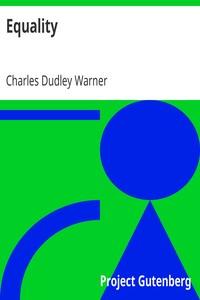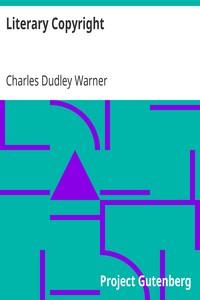Read this ebook for free! No credit card needed, absolutely nothing to pay.
Words: 7288 in 2 pages
This is an ebook sharing website. You can read the uploaded ebooks for free here. No credit cards needed, nothing to pay. If you want to own a digital copy of the ebook, or want to read offline with your favorite ebook-reader, then you can choose to buy and download the ebook.
LITERARY COPYRIGHT
This is the first public meeting of the National Institute of Arts and Letters. The original members were selected by an invitation from the American Social Science Association, which acted under the power of its charter from the Congress of the United States. The members thus selected, who joined the Social Science Association, were given the alternative of organizing as an independent institute or as a branch of the Social Science Association.
At the annual meeting of the Social Science Association on September 4, 1899, at Saratoga Springs, the members of the Institute voted to organize independently. They formally adopted the revised constitution, which had been agreed upon at the first meeting, in New York in the preceding January, and elected officers as prescribed by the constitution.
It is believed that the advancement of art and literature in this country will be promoted by the organization of the producers of literature and art. This is in strict analogy with the action of other professions and of almost all the industries. No one doubts that literature and art are or should be leading interests in our civilization, and their dignity will be enhanced in the public estimation by a visible organization of their representatives, who are seriously determined upon raising the standards by which the work of writers and artists is judged. The association of persons having this common aim cannot but stimulate effort, soften unworthy rivalry into generous competition, and promote enthusiasm and good fellowship in their work. The mere coming together to compare views and discuss interests and tendencies and problems which concern both the workers and the great public, cannot fail to be of benefit to both.
In no other way so well as by association of this sort can be created the feeling of solidarity in our literature, and the recognition of its power. It is not expected to raise any standard of perfection, or in any way to hamper individual development, but a body of concentrated opinion may raise the standard by promoting healthful and helpful criticism, by discouraging mediocrity and meretricious smartness, by keeping alive the traditions of good literature, while it is hospitable to all discoverers of new worlds. A safe motto for any such society would be Tradition and Freedom--'Traditio et Libertas'.
It is generally conceded that what literature in America needs at this moment is honest, competent, sound criticism. This is not likely to be attained by sporadic efforts, especially in a democracy of letters where the critics are not always superior to the criticised, where the man in front of the book is not always a better marksman than the man behind the book. It may not be attained even by an organization of men united upon certain standards of excellence. I do not like to use the word authority, but it is not unreasonable to suppose that the public will be influenced by a body devoted to the advancement of art and literature, whose sincerity and discernment it has learned to respect, and admission into whose ranks will, I hope, be considered a distinction to be sought for by good work. The fashion of the day is rarely the judgment of posterity. You will recall what Byron wrote to Coleridge: "I trust you do not permit yourself to be depressed by the temporary partiality of what is called 'the public' for the favorites of the moment; all experience is against the permanency of such impressions. You must have lived to see many of these pass away, and will survive many more."
The chief concern of the National Institute is with the production of works of art and of literature, and with their distribution. In the remarks following I shall confine myself to the production and distribution of literature. In the limits of this brief address I can only in outline speak of certain tendencies and practices which are affecting this production and this distribution. The interests involved are, first, those of the author; second, those of the publisher; third, those of the public. As to all good literature, the interests of these three are identical if the relations of the three are on the proper basis. For the author, a good book is of more pecuniary value than a poor one, setting aside the question of fame; to the publisher, the right of publishing a good book is solid capital,--an established house, in the long run, makes more money on "Standards" than on "Catchpennies"; and to the public the possession of the best literature is the breath of life, as that of the bad and mediocre is moral and intellectual decadence. But in practice the interests of the three do not harmonize. The author, even supposing his efforts are stimulated by the highest aspirations for excellence and not by any commercial instinct, is compelled by his circumstances to get the best price for his production; the publisher wishes to get the utmost return for his capital and his energy; and the public wants the best going for the least money.
Consider first the author, and I mean the author, and not the mere craftsman who manufactures books for a recognized market. His sole capital is his talent. His brain may be likened to a mine, gold, silver, copper, iron, or tin, which looks like silver when new. Whatever it is, the vein of valuable ore is limited, in most cases it is slight. When it is worked out, the man is at the end of his resources. Has he expended or produced capital? I say he has produced it, and contributed to the wealth of the world, and that he is as truly entitled to the usufruct of it as the miner who takes gold or silver out of the earth. For how long? I will speak of that later on. The copyright of a book is not analogous to the patent right of an invention, which may become of universal necessity to the world. Nor should the greater share of this usufruct be absorbed by the manufacturer and publisher of the book. The publisher has a clear right to guard himself against risks, as he has the right of refusal to assume them. But there is an injustice somewhere, when for many a book, valued and even profitable to somebody, the author does not receive the price of a laborer's day wages for the time spent on it--to say nothing of the long years of its gestation.
The situation is full of complications. Theoretically it is the interest of both parties to sell as many books as possible. But the author has an interest in one book, the publisher in a hundred. And it is natural and reasonable that the man who risks his money should be the judge of the policy best for his whole establishment. I cannot but think that this situation would be on a juster footing all round if the author returned to the old practice of limiting the use of his property by the publisher. I say this in full recognition of the fact that the publishers might be unwilling to make temporary investments, or to take risks. What then? Fewer books might be published. Less vanity might be gratified. Less money might be risked in experiments upon the public, and more might be made by distributing good literature. Would the public be injured? It is an idea already discredited that the world owes a living to everybody who thinks he can write, and it is a superstition already fading that capital which exploits literature as a trade acquires any special privileges.
The present international copyright, which primarily concerns itself with the manufacture of books, rests upon an unintelligible protective tariff basis. It should rest primarily upon an acknowledgment of the author's right of property in his own work, the same universal right that he has in any other personal property. The author's international copyright should be no more hampered by restrictions and encumbrances than his national copyright. Whatever regulations the government may make for the protection of manufactures, or trade industries, or for purposes of revenue on importations, they should not be confounded with the author's right of property. They have no business in an international copyright act, agreement, or treaty. The United States copyright for native authors contains no manufacturing restrictions. All we ask is that foreign authors shall enjoy the same privileges we have under our law, and that foreign nations shall give our authors the privileges of their local copyright laws. I do not know any American author of any standing who has ever asked or desired protection against foreign authors.
This subject is so important that I may be permitted to enlarge upon it, in order to make clear suggestions already made, and to array again arguments more or less familiar. I do this in the view of bringing before the institute work worthy of its best efforts, which if successful will entitle this body to the gratitude and respect of the country. I refer to the speedy revision of our confused and wholly inadequate American copyright laws, and later on to a readjustment of our international relations.
In the first place let me bring to your attention what is, to the vast body of authors, a subject of vital interest, which it is not too much to say has never received that treatment from authors themselves which its importance demands. I refer to the property of authors in their productions. In this brief space and time I cannot enter fully upon this great subject, but must be content to offer certain suggestions for your consideration.
Free books android app tbrJar TBR JAR Read Free books online gutenberg
More posts by @FreeBooks










